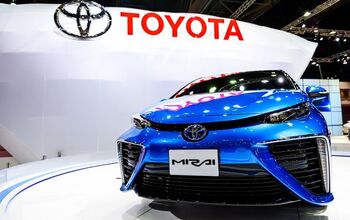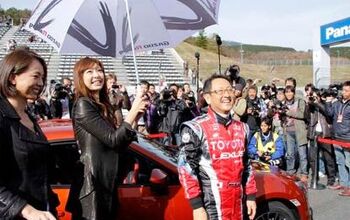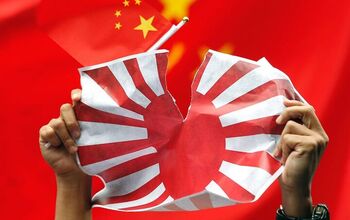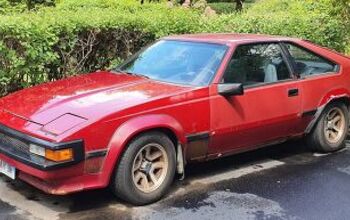Japanese Automakers: Sayonara, Japan

Japanese automakers will move their production elsewhere if the yen keeps rising. This is what Toshiyuki Shiga, chairman of the Japan Automobile Manufacturers Association, told The Nikkei [sub] in a very blunt interview. Shiga, who is also the COO of Nissan, said that power shortfalls and the strong yen are the biggest impediment to Japan’s most important industry.
The industry can work around the power shortages. Last weekend was the first when Japan’s automakers worked. They will instead take Thursday’s and Friday’s off, putting less strain on the grid. That system would work better if other industries would come to similar arrangements, but it works.
As far as the currency goes, the manufacturers can just watch and be sweat even more than what is caused by air-conditioning set to 82 F. Today, a dollar bought 80 yen. That won’t get you far in Japan. Not even to the next subway station.
Said the Chairman of Japan’s Automobile Manufacturers Association:
“It is strange that the government has allowed the yen to rise so high. Ever since automakers’ supply chain systems were damaged, the companies have been thinking about whether they should try to restore their supply chains to their pre-disaster conditions or instead turn to overseas suppliers.”
“It would not be surprising if some Japanese firms changed their procurement methods if things continue as they currently are.”
“No Japanese manufacturer can generate a profit from exports at an exchange rate of 80 yen to the dollar.”
“For years, Japanese carmakers collectively continued to turn out around 10 million vehicles domestically, and that did a lot to help keep the jobless rate from rising to the two-digit level. But people should not be so optimistic as to believe that automakers would never pull out of the home country.”
To make matters worse for the Japanese industry, a free-trade agreement between South Korea and the EU just took effect, helping Hyundai and Kia even more. The Japanese government could end its foot-dragging at least on that front.
As far as the currency goes, the governmental hands are pretty much tied. The oldest trick in the book is to lower interest rates. If Japanese interest rates would go any lower, you would have to pay the bank for taking your money. Quantitative easing? Japan invented quantitative easing, and look what that did to their currency.
Think about it: Here is a country that never recovered from the crash following the big 1990s bubble. It was hit by what some say was the force of a thousand times the power of all nuclear bombs on earth. Yet, people around the world are buying its currency. Makes you wonder about what’s going on around the world.

Bertel Schmitt comes back to journalism after taking a 35 year break in advertising and marketing. He ran and owned advertising agencies in Duesseldorf, Germany, and New York City. Volkswagen A.G. was Bertel's most important corporate account. Schmitt's advertising and marketing career touched many corners of the industry with a special focus on automotive products and services. Since 2004, he lives in Japan and China with his wife <a href="http://www.tomokoandbertel.com"> Tomoko </a>. Bertel Schmitt is a founding board member of the <a href="http://www.offshoresuperseries.com"> Offshore Super Series </a>, an American offshore powerboat racing organization. He is co-owner of the racing team Typhoon.
More by Bertel Schmitt
Latest Car Reviews
Read moreLatest Product Reviews
Read moreRecent Comments
- Probert They already have hybrids, but these won't ever be them as they are built on the modular E-GMP skateboard.
- Justin You guys still looking for that sportbak? I just saw one on the Facebook marketplace in Arizona
- 28-Cars-Later I cannot remember what happens now, but there are whiteblocks in this period which develop a "tick" like sound which indicates they are toast (maybe head gasket?). Ten or so years ago I looked at an '03 or '04 S60 (I forget why) and I brought my Volvo indy along to tell me if it was worth my time - it ticked and that's when I learned this. This XC90 is probably worth about $300 as it sits, not kidding, and it will cost you conservatively $2500 for an engine swap (all the ones I see on car-part.com have north of 130K miles starting at $1,100 and that's not including freight to a shop, shop labor, other internals to do such as timing belt while engine out etc).
- 28-Cars-Later Ford reported it lost $132,000 for each of its 10,000 electric vehicles sold in the first quarter of 2024, according to CNN. The sales were down 20 percent from the first quarter of 2023 and would “drag down earnings for the company overall.”The losses include “hundreds of millions being spent on research and development of the next generation of EVs for Ford. Those investments are years away from paying off.” [if they ever are recouped] Ford is the only major carmaker breaking out EV numbers by themselves. But other marques likely suffer similar losses. https://www.zerohedge.com/political/fords-120000-loss-vehicle-shows-california-ev-goals-are-impossible Given these facts, how did Tesla ever produce anything in volume let alone profit?
- AZFelix Let's forego all of this dilly-dallying with autonomous cars and cut right to the chase and the only real solution.

































Comments
Join the conversation
Things are looking bleak for Japan - some suggest they could be in for a third "Lost Decade": http://www.theglobeandmail.com/report-on-business/international-news/asian-pacific/japan-could-face-a-third-lost-decade/article2076733/ As pointed out, the government doesn't really have any levers to pull to lower the currency at this point - after dropping throwing money from helicopters for 20 years there's not much else that can be done in the near future. The June sales figures posted earlier show us that many in America (arguably Japan's most important market) have moved to Domestic or Korean cars. At least some of those lost customers will have good ownership experiences, and won't be back.